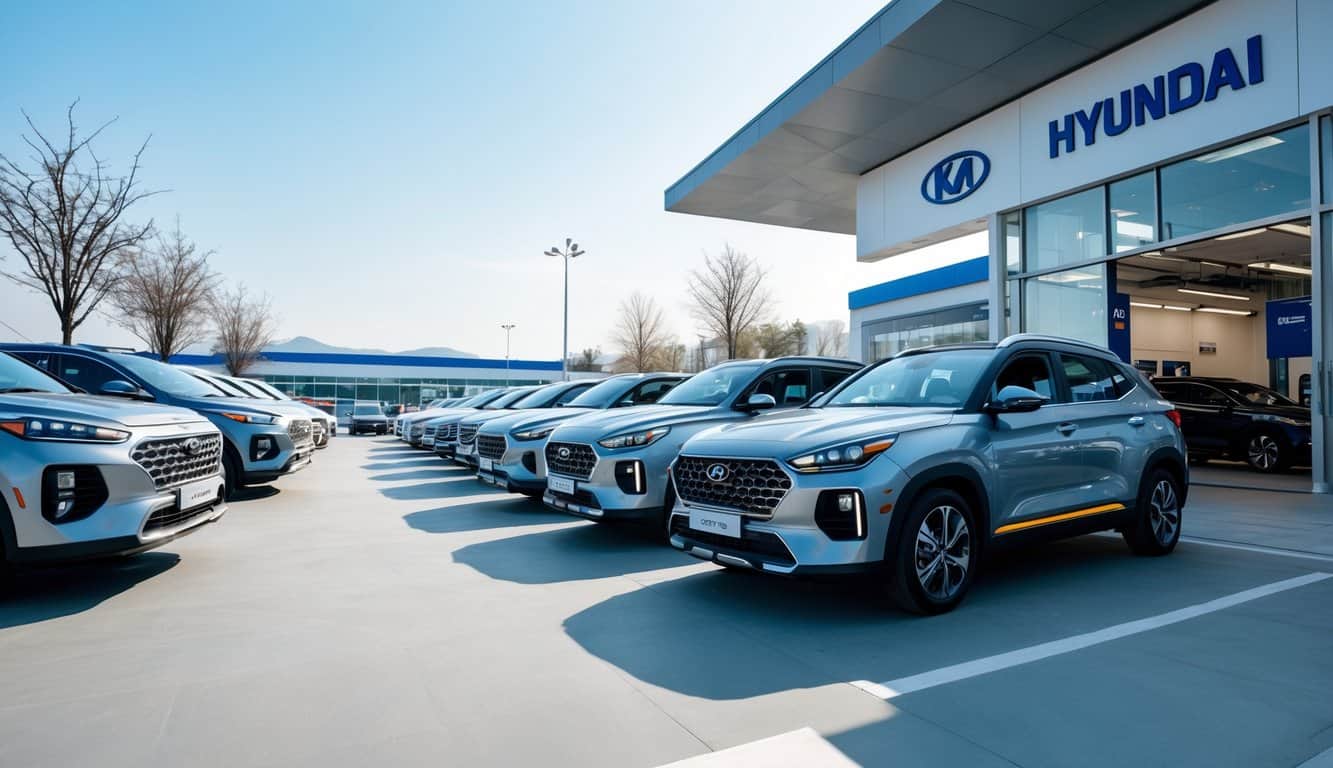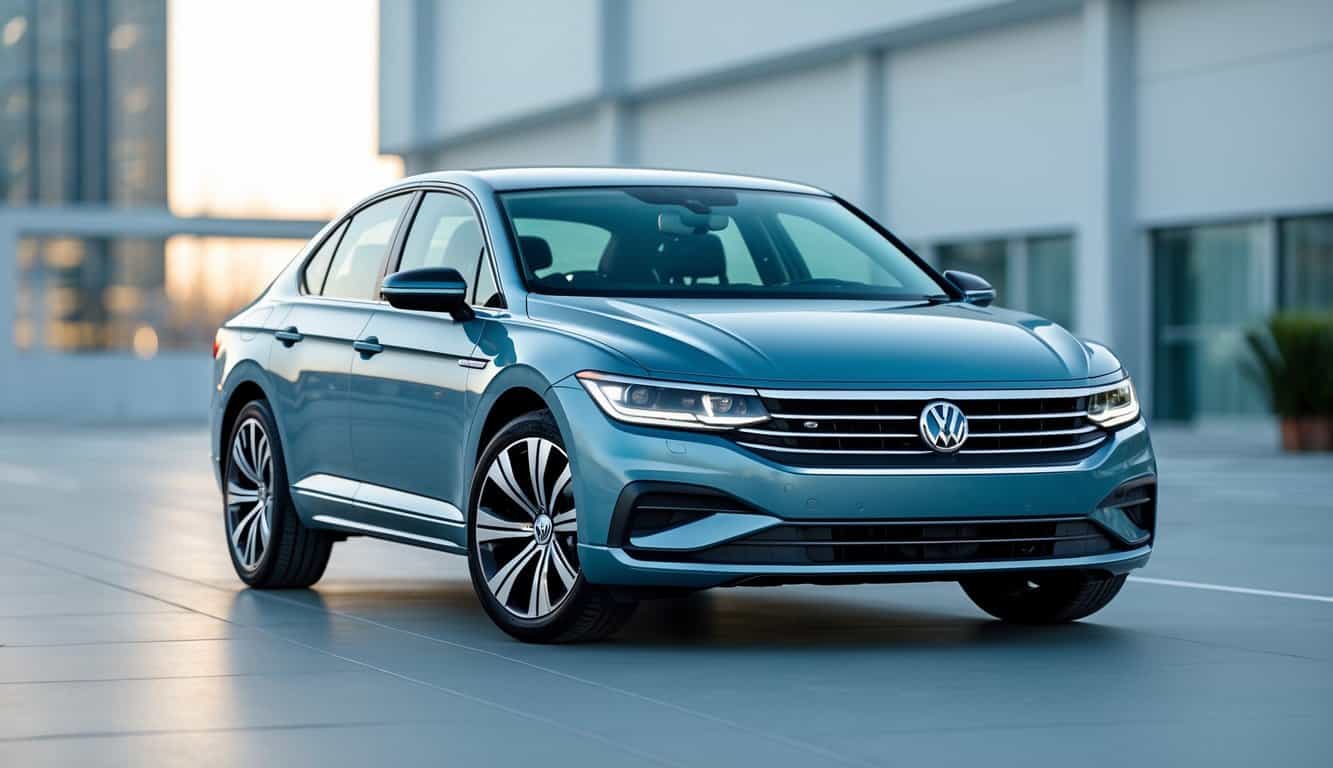Car Manufacturers With The Most Active Recalls In 2025: The Shocking Leaders
Vehicle recalls happen to every automaker, but some brands rack up numbers that make you wonder if they’re collecting them like trading cards. The data shows certain manufacturers consistently lead the pack when it comes to active recalls, with some hitting triple digits that demand attention from current and future owners.

We’re diving into the brands that keep the National Highway Traffic Safety Administration busy, from traditional Detroit giants to tech-forward newcomers. Whether it’s engine fires, faulty airbags, or software glitches, these recall patterns reveal important truths about manufacturing practices and what they mean for your next vehicle purchase.

“Drive Past Myths: Get the Real Deal on Car Buying!”
🚘 Uncover 13 Car Buying Misconceptions with Our FREE Newsletter!
Plus you will get our quick tips, expert advice, and myth-busting insights delivered straight to your inbox.
Subscribe now and make informed decisions without the detours.
“Experts Hate This! Learn the Car Buying Secrets They Don’t Want You to Know. Free Subscription!”
9) Hyundai/Kia – Korean automakers have improved, but recent recalls for engine fires and braking problems still hit hard.

Look, we’ve got to give credit where it’s due. Hyundai and Kia have come a long way from their budget reputation days. Their build quality has improved dramatically, and they’re backing their cars with some of the best warranties in the business.
But here’s the thing that keeps biting them. Engine fires and brake problems keep showing up like that friend who always crashes on your couch. Over 13 million vehicles have been recalled since 2010 for engine issues.
The latest headache? Kia and Hyundai recalled 3.3 million cars because they can catch fire while parked or driving. That’s due to problems with the antilock brake system, where brake fluid leaks can cause electrical shorts.
What really gets us is that most recalled vehicles are still on the road without repairs. We’re talking about cars that owners are supposed to park outside, away from buildings, until they get fixed.
The pattern is frustrating. U.S. safety regulators opened a probe into 16 separate recalls covering 6.4 million vehicles. That’s not a coincidence.
We want to see these brands succeed because they offer real value. But when your car might catch fire in the driveway, that 10-year warranty doesn’t feel as comforting.
8) Volkswagen – Known for diesel debacles and airbag recalls, VW’s tally makes it a brand you double-check before buying used.

Volkswagen keeps us busy tracking recalls, and not in a good way. The German automaker has earned a reputation for major safety issues that affect hundreds of thousands of vehicles at once.
The diesel scandal still haunts VW, but their airbag problems are what we’re watching now. Volkswagen recalled over 114,000 vehicles in late 2024 because driver’s side airbags could explode during deployment.
That’s just one of several airbag recalls hitting VW recently. Earlier in 2024, they recalled more than 270,000 SUVs because passenger airbags might not deploy at all during a crash.
The pattern here is troubling. We’re seeing consistent safety issues with critical systems like airbags across multiple model years and vehicle types.
What makes VW tricky is how these recalls can hit popular models like the Jetta, Golf, and Passat. These are cars we see everywhere on used lots.
Before buying any used Volkswagen, we always recommend checking the VW recall lookup tool with the specific VIN. This step could save you from inheriting someone else’s safety headache.
The recall frequency doesn’t make VW vehicles automatically bad choices. But it does mean we need to be extra careful about maintenance records and recall completion when shopping used.
7) Nissan – With recalls tied mostly to seat belts and fuel systems, their count demands attention from midsize sedan owners.
Nissan has been keeping the recall departments busy this year, and if you’re driving one of their popular midsize sedans, we need to talk. The numbers are pretty eye-opening when you dig into what’s actually happening.
The big story is engine trouble. Nissan recalled over 440,000 vehicles due to engine failure issues that could leave you stranded. This includes 2019-2020 Altima models, which hits right at the heart of their midsize sedan lineup.
But engines aren’t the only problem. We’re seeing serious safety concerns with basic crash protection systems.
Nissan recalls nearly 4 million cars with air bag problems where passenger airbags or seat belts could fail during a crash. That’s the kind of recall that makes us lose sleep at night.
The seat belt issues are particularly troubling. Nissan recalled certain 2021-2022 Rogue vehicles because rear seat belts won’t retract properly. When your safety systems don’t work as designed, that’s a problem we can’t ignore.
What really gets our attention is the pattern. These aren’t isolated incidents but recurring themes around fundamental safety and reliability components.
If you own a Nissan, especially an Altima or Rogue, we strongly recommend checking your VIN against current recalls. The good news is Nissan provides VIN lookup tools to help you stay informed about your vehicle’s status.
6) Tesla – High-tech hype doesn’t avoid recalls; electrical systems and Autopilot software issues have pushed numbers up.
Look, we love innovation as much as the next gearhead, but Tesla’s recall numbers tell a story that even the most devoted fanboys can’t ignore. The company‘s push to be first with everything has created some serious headaches.
The big one hit in late 2023 when Tesla recalled more than 2 million vehicles to fix Autopilot issues. That’s basically every Tesla on American roads at the time.
Federal regulators found that Tesla’s Autopilot had a critical safety gap that contributed to at least 467 collisions, with 13 deaths. The system was too easy to misuse because it didn’t properly monitor if drivers were paying attention.
Tesla’s fix was a software update that made warning messages more aggressive. But safety experts say the recall fix doesn’t go far enough to prevent misuse and distraction.
We’ve also seen electrical system recalls affecting door handles, touchscreens, and charging components. When you’re pushing tech boundaries, sometimes things break in ways nobody expected.
The irony? Tesla’s over-the-air update ability means many recalls get fixed without visiting a service center. But that same software-first approach created many of these problems in the first place.
5) Honda – A favorite for reliability, but still shows up with dozens of recalls linked to safety systems and emissions.
Honda has built its reputation on being the reliable choice. We all know that friend who swears by their Civic or CR-V that just won’t quit. But even the most dependable brands aren’t perfect.
Honda recalled 2.6 million vehicles due to defective fuel pumps that can fail without warning. When your fuel pump dies, your car just stops. Not exactly the Honda reliability we’re used to hearing about.
The company has also dealt with steering issues, seat belt problems, and brake master cylinder defects. These aren’t minor annoyances either. We’re talking about systems that keep us safe on the road.
Recent recalls affected 1.7 million vehicles, including Acura Integras, Honda CR-V, and HR-V models. That’s a lot of vehicles for a brand that prides itself on getting things right the first time.
What’s interesting is that Honda places a high priority on customer feedback and safety. They’re not hiding from these issues. All safety recall repairs are free at authorized Honda dealers, which shows they stand behind their products.
The recalls haven’t killed Honda’s reputation completely. They still rank among the top reliable brands. But it’s a reminder that no manufacturer is bulletproof, even ones we’ve trusted for decades.
4) Toyota – The world’s biggest automaker isn’t perfect, averaging significant recalls often related to electronics or airbags.
Look, we get it. When you think Toyota, you think bulletproof reliability. But even Toyota remains world’s top-selling automaker has its share of recall headaches.
The company that sold 10.8 million vehicles in 2024 deals with recalls at a scale that matches their massive production numbers. When you’re building that many cars, even small problems become big ones fast.
Electronics are a major pain point for Toyota. Modern Toyotas pack more computers than a NASA mission, and sometimes those systems go haywire. We’ve seen recalls for faulty backup cameras, wonky infotainment systems, and power steering glitches.
Airbags are another recurring issue. Toyota got caught up in the massive Takata airbag crisis that hit the entire industry. These defective airbags could explode with deadly force, affecting millions of Toyota and Lexus vehicles.
What’s frustrating is that Toyota knows better. In the early 2000s, the company faced significant challenges related to its reputation for safety and reliability. They had major recalls for unintended acceleration and faulty airbags that nearly tanked their reputation.
The good news? Toyota typically handles recalls well once they acknowledge problems. They’re thorough about fixes and don’t mess around with safety issues. But for a company that built its reputation on doing things right the first time, these frequent recalls feel like a step backward.
3) General Motors – GM’s mix of Chevy, GMC, and Cadillac models means 300+ recalls; their sheer volume keeps them in the spotlight.
When we talk about recalls, General Motors consistently lands in the top three. It’s not necessarily because they build worse cars than anyone else. It’s because they build so many of them.
GM’s brand portfolio includes Chevrolet, GMC, Buick, and Cadillac, and that’s a lot of metal rolling off production lines. More vehicles mean more opportunities for things to go sideways.
Here’s the thing about GM’s recall numbers. They’re spread across multiple brands that share platforms and parts. When a Silverado gets recalled for a steering issue, there’s a good chance the GMC Sierra gets hit too since they’re basically the same truck with different badges.
We’ve seen this pattern play out repeatedly. GMC and Chevrolet trucks often share platforms, parts, and drivetrains, so problems tend to multiply across brand lines.
The recall spotlight stays on GM partly because of their market presence. In 2024, GM delivered 2.7 million vehicles in the USA, which represents a massive installed base of vehicles that could potentially need fixes.
From our perspective, GM’s recall frequency reflects their production scale more than systematic quality issues. When you’re churning out millions of Silverados, Tahoes, and Cadillac Escalades, even small defect rates translate to big recall numbers.
The company has actually improved their response times and recall processes over the years. They’re more proactive about identifying problems before they become safety hazards.
However, their latest problem could be bigger than they expected. They recalled more than 600,000 vehicles because of the V8 engine and, apparently, they already knew about the problem.
2) Chrysler (Stellantis) – Clocking 386 recalls, Jeep, Ram, and Dodge have had their share of hiccups worth noting.
Look, we get it. Stellantis brands like Jeep, Ram, and Dodge build some seriously cool rides that we actually want to drive. But man, they sure know how to keep the recall department busy.
The numbers don’t lie here. With 386 active recalls, Stellantis is having what we’d politely call “a moment.” We’re talking about everything from software glitches to headlight problems across their lineup.
One of the biggest headaches? Stellantis recalled nearly 1.2 million vehicles because of a software bug that could disable the rearview camera. That’s not exactly the kind of surprise you want when backing out of your driveway.
The recall hit popular models like the Jeep Wrangler, Grand Cherokee, and Ram 1500. Even the Dodge Durango got caught up in the mess.
But wait, there’s more. Stellantis issued five separate recalls on the same day affecting over 80,000 vehicles. Talk about efficiency, right?
The good news? Most of these issues get fixed with software updates that happen over the air. We’re not talking about major mechanical failures that’ll leave you stranded.
Still, when you’re buying a Jeep Wrangler or Ram 1500, it’s worth checking recall history. These are solid vehicles when they’re running right, but staying on top of updates is part of modern ownership now.
1) Ford Motor Company – With 458 recalls, the Blue Oval shows no signs of slowing down in the recall game, especially on trucks and SUVs.
Look, we’ve been watching Ford’s recall situation unfold this year, and it’s honestly gotten a bit wild. Ford has issued 81 recalls in 2025 so far, which already beats their entire 2024 total. We’re only halfway through the year.
The math here is pretty simple. Ford is averaging about one recall every two days. That’s not exactly the kind of consistency we want to see from our trucks and SUVs.
Their popular models are taking the biggest hits. The Ford Explorer has faced multiple recalls, including ongoing issues with rear axle bolt fractures. We’re talking about nearly half a million 2016 and 2017 Explorers dealing with quality control problems.
Ford’s truck lineup isn’t escaping either. Eight new Ford recalls have been issued recently covering F-Series trucks, Expeditions, and Mavericks. The issues range from electrical problems to mechanical failures.
We’ve also seen Ford recall nearly 300,000 SUVs and pickup trucks for faulty batteries. When your daily driver won’t start because of a recall issue, that’s frustrating.
The good news? Ford makes it pretty easy to check for recalls using your VIN or through their FordPass app. If you own a Ford, we’d recommend checking regularly given how often new recalls are popping up.
How Recalls Happen And Why They Matter
Car recalls aren’t just paperwork headaches. They’re safety nets that protect us from potentially dangerous defects, and understanding how they work helps us make smarter decisions about our vehicles.
What Triggers A Recall
Three main players can trigger a recall. The manufacturer might discover a problem during testing or customer complaints. The National Highway Traffic Safety Administration (NHTSA) can investigate and force a recall. Sometimes we consumers report enough issues that it gets the ball rolling.
Let’s break down the most common triggers:
Manufacturing Defects
- Faulty parts that slip through quality control
- Assembly line errors affecting multiple vehicles
- Software glitches in modern computerized systems
Safety Standard Violations
The NHTSA sets strict safety standards. When vehicles don’t meet these requirements, recalls happen to protect consumers.
Consumer Reports
If enough of us report the same problem, it creates a pattern. The NHTSA tracks these complaints and investigates when red flags appear.
I’ve seen recalls triggered by everything from sticky accelerator pedals to airbags that don’t deploy correctly. The key is that someone notices the pattern and takes action.
Why Timely Fixes Make All The Difference
Here’s where things get serious. Ignoring recalls isn’t just risky – it’s potentially deadly.
Safety First
Recalled parts can fail when we need them most. Faulty brakes, defective airbags, or steering problems don’t wait for convenient moments to malfunction.
Legal Protection
When manufacturers issue recalls, they’re legally required to fix the problem for free. Miss the window, and we might pay out of pocket later.
Resale Value
Unaddressed recalls hurt our vehicle’s value. Smart buyers check recall history before purchasing.
The good news? Most recall repairs are straightforward. Dealers handle the paperwork, and we get our vehicles back safer than before. It’s a minor inconvenience that prevents major headaches down the road.
What Active Recalls Reveal About Manufacturer Practices
Active recalls tell us a lot about how automakers approach quality control and customer safety. We can spot clear patterns in how different companies handle manufacturing issues and see exactly how these problems affect daily drivers.
Patterns In Quality Control
Looking at recall data, we notice some manufacturers consistently struggle with the same types of issues. Ford had 94 recalls affecting over 5.6 million vehicles between January 2024 and March 2025, according to car recall statistics. That’s not just bad luck.
Some patterns we see include:
- Electrical system failures in certain brands
- Transmission problems that keep coming back
- Software glitches in newer tech-heavy vehicles
The companies that issue fewer recalls often have stricter testing protocols before vehicles hit the market. They catch problems in the factory instead of your driveway.
Vehicle recalls peaked in 2021 with 987 total recalls, showing that quality control issues aren’t going away. Some manufacturers learn from these mistakes and improve their processes. Others seem to repeat the same problems year after year.
The Impact On Everyday Drivers
For us regular drivers, recalls mean real inconvenience and potential safety risks. We have to take time off work to get our vehicles fixed. We worry about whether our daily driver is safe for our families.
Voluntary recalls often happen when manufacturers know about problems but haven’t received many complaints yet. This shows some companies are more proactive about customer safety than others.
The manufacturers with fewer recalls typically have:
- Better initial quality control
- More thorough pre-production testing
- Faster response times to emerging issues
When we buy a vehicle from a brand with a history of frequent recalls, we’re essentially signing up for more trips to the service department. That’s not just annoying – it’s expensive in terms of lost time and potential repair costs once the warranty expires.
